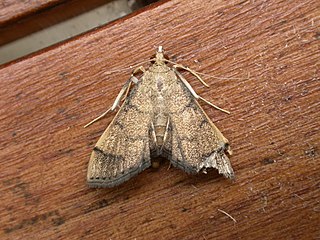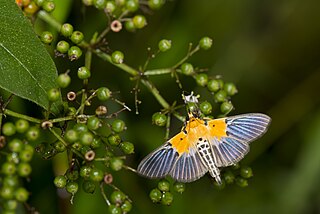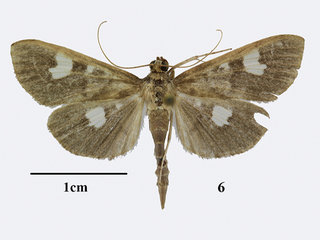
The Pyralidae, commonly called pyralid moths, snout moths or grass moths, are a family of Lepidoptera in the ditrysian superfamily Pyraloidea. In many classifications, the grass moths (Crambidae) are included in the Pyralidae as a subfamily, making the combined group one of the largest families in the Lepidoptera. The latest review by Eugene G. Munroe and Maria Alma Solis retain the Crambidae as a full family of Pyraloidea.

The Pyraloidea are a moth superfamily containing about 16,000 described species worldwide, and probably at least as many more remain to be described. They are generally fairly small moths, and as such, they have been traditionally associated with the paraphyletic Microlepidoptera.

Spilomelinae is a very species-rich subfamily of the lepidopteran family Crambidae, the crambid snout moths. With 4,135 described species in 344 genera worldwide, it is the most speciose group among pyraloids.

In biological taxonomy, circumscription is the content of a taxon, that is, the delimitation of which subordinate taxa are parts of that taxon. For example, if we determine that species X, Y, and Z belong in genus A, and species T, U, V, and W belong in genus B, those are our circumscriptions of those two genera. Another systematist might determine that T, U, V, W, X, Y, and Z all belong in genus A. Agreement on circumscriptions is not governed by the Codes of Zoological or Botanical Nomenclature, and must be reached by scientific consensus.

Ancylolomia is a genus of moths of the family Crambidae described by Jacob Hübner in 1825.

Sufetula is a genus of moths of the family Crambidae.

Parapoynx fluctuosalis or Fluctuating China-mark or Waved China-mark, is a moth of the family Crambidae. It is a widespread species, known from Africa, India, Sri Lanka, China, Japan, Malaysia, Taiwan, Guam, Hawaii, Fiji, Australia and the Galápagos Islands. It is also an introduced species in Europe, where it has been recorded from Great Britain, the Iberian Peninsula and Sardinia.

Pyralis manihotalis is a moth of the family Pyralidae described by Achille Guenée in 1854.

Hypsopygia mauritialis is a moth of the family Pyralidae described by Jean Baptiste Boisduval in 1833. It is a widespread species, known from Africa, India, China, Malaysia, Taiwan, Japan, Australia and Hawaii.

Pyralis regalis is a species of snout moth. It is found from most of Europe east to Asia, including China, Cambodia, Myanmar, India, Russia, Korea, Japan and Taiwan.

Glyphodes negatalis, the karanj defoliator, is a moth of the family Crambidae. The species was first described by Francis Walker in 1859. It has a wide range in the tropics, including South Africa, The Gambia, Mali, India, Sri Lanka, Hong Kong, Japan, and eastern Australia.

Omiodes indicata, the bean-leaf webworm moth or soybean leaf folder, is a species of moth of the family Crambidae. It is found from Florida to Texas, the West Indies and Mexico to South America, Cameroon, the Comoros, the Democratic Republic of Congo, La Réunion, Madagascar, Mauritius, Nigeria, Saudi Arabia, the Seychelles, South Africa, India, Borneo and Australia (Queensland).
Thylacoptila paurosema is a species of moth of the family Pyralidae. It has a wide range and is found on the Canary Islands, Cabo Verde, Ethiopia, Ghana, Réunion, Saudi Arabia, Sierra Leone, Sudan, Namibia, South Africa, Yemen, Madagascar, Indonesia, Burma, Malaysia, Pakistan, Sri Lanka, India and Ascension Island.

Glaphyriinae is a subfamily of the lepidopteran family Crambidae. It was described by William Trowbridge Merrifield Forbes in 1923. The subfamily currently comprises 509 species in 75 genera.

Scopariinae is a subfamily of the lepidopteran family Crambidae. The subfamily was described by Achille Guenée in 1854.
Ancylolomia westwoodi, the Westwood's grass-moth, is a moth in the family Crambidae. It was described by Zeller in 1863. It is found in Afghanistan, Iran, western Pakistan, India, Sri Lanka, Sulawesi, Java, Bali, Malaysia, Sumatra and Australia, where it has been recorded from the Northern Territory and Queensland. It is externally indistinguishable from Ancylolomia indica, but generally darker. A.w.bitubirosella is one of the most common Crambinae in India.
Surattha nigrifascialis is a moth in the family Crambidae. It is found in India.

Nevrina procopia is a moth in the family Crambidae. It was described by Stoll in 1781. The type locality is unknown. It is found from Sri Lanka, India, Bhutan, South China, Taiwan, southern Japan, Philippines, Malaysia, Singapore, Sumatra, Java, and New Guinea.

Agroterini is a tribe of the species-rich subfamily Spilomelinae in the pyraloid moth family Crambidae. The tribe was erected by Alexandre Noël Charles Acloque in 1897.

Margaroniini is a tribe of the species-rich subfamily Spilomelinae in the pyraloid moth family Crambidae. The tribe was erected by Charles Swinhoe and Everard Charles Cotes in 1889, originally as family Margaronidae.

















